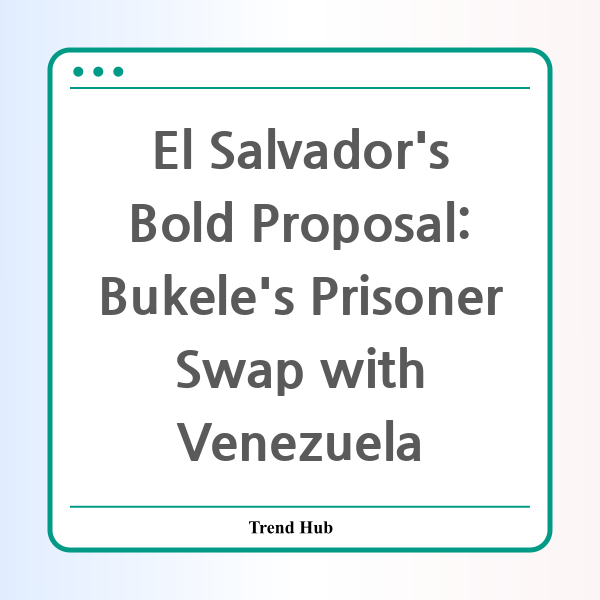* This website participates in the Amazon Affiliate Program and earns from qualifying purchases.

In an unexpected and bold move, Salvadoran President Nayib Bukele has proposed a prisoner exchange with Venezuela, igniting discussions that delve deep into the political complexities of the region. But what does this mean for the diplomatic relations between El Salvador and Venezuela, especially in the context of recent deportations from the U.S.?
On social media, Bukele called for a swap involving 252 Venezuelan nationals currently detained in El Salvador in exchange for an equal number of political prisoners held in Venezuela. Bukele's rationale is clear: he claims that many of the detained Venezuelans are there for serious crimes, while those being held as political prisoners in Venezuela merely oppose the government of President Nicolás Maduro.
Breaking Down the Proposal
Bukele, often described as "the world's coolest dictator," has gained popularity among his constituents for his aggressive stance against crime, which includes the suspension of certain civil liberties. His proposal, however, has drawn criticism from international human rights organizations, who accuse him of violations in his anti-gang campaigns. Yet, his approach continues to resonate with many Salvadorans.
In his proposal, Bukele emphasized the drastic differences between the two groups of prisoners. He stated, "Unlike our detainees, many of whom have committed murder, others have committed rape, and some have even been arrested multiple times before being deported, your political prisoners have committed no crime." This statement adds a layer of moral authority to his bargaining position, framing the Venezuelan detainees as victims of their government policies.
Responses from Venezuela
Venezuela’s Chief Prosecutor Tarek William Saab responded to Bukele's offer with skepticism, demanding clarity on the charges against the Salvadoran detainees. He questioned whether these individuals had received due process within El Salvador’s legal system. The Venezuelan government has consistently denied the existence of political prisoners, a assertion that human rights organizations sharply contest.
The backdrop to this proposal is also significant: the recent deportations of over 200 Venezuelans from the U.S. to El Salvador under the Trump administration’s hard-line immigration policies. Accusations of gang involvement, particularly with the Tren de Aragua gang, have been made against these deportees. This context raises questions about the motivations behind Bukele’s offer—whether it’s a humanitarian gesture or a calculated move to enhance his political standing both locally and internationally.
Implications for Future Relations
The potential for a prisoner swap presents a unique opportunity for both nations. For Bukele, it could solidify his image as a leader willing to take risks for social justice, appealing to both domestic and international audiences. For Maduro, engaging in dialogue could be a means to alleviate pressure from human rights groups and potentially improve relations with other countries.
As the talks progress, many will be watching closely to see if this proposal paves the way for meaningful exchanges or simply remains a rhetorical device in the complex landscape of Central American politics.
Conclusion
President Nayib Bukele's proposal for a prisoner exchange not only sheds light on the fraught relationship between El Salvador and Venezuela but also highlights the broader issues of human rights and the consequences of strict immigration policies. Whether this initiative will lead to tangible results or become another chapter in the rich history of Latin American political maneuvering remains to be seen.
* This website participates in the Amazon Affiliate Program and earns from qualifying purchases.